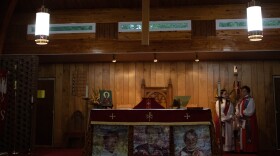https://www.youtube.com/watch?v=H9hMU-8oXfk
Joshua Bratcher, 18, just graduated from Trinity School and will be attending NC A&T State University this fall.
As a part of our on-going series of stories from the WUNC Summer Youth Reporting Institute, Joshua Bratcher talked to people in his community about the significance of alternative hairstyles as you look for a job.
I’m 19 years old, I just graduated from high school and I have dreadlocks. I never realized that I could be stereotyped for my hair. That was until I interviewed with Ms. Beverly Mahone for an internship with the Durham Youth Summer Program. She said she was alright with my hair but others might have an issue.
"I think that when you wear your hair in an alternative hairstyle, the majority culture tends to look at you differently, and they tend to look at you more negatively," Mahone said. "Whether you're articulate, whether you're the smartest person, whether you're the best candidate for the job, they're going to see a different image."
This happened to my cousin Monte’ Caldwell. He looked for jobs for a year and at one interview, they told him his dreads didn’t fit the look of the company.
"They didn’t beat around the bush. They told me it was my hair. It was discrimination basically," he said. "It was like a step back. I had a good job history but my hair was the problem."
Monte’ did cut his hair. He said he didn’t do it for the job, however, he did know that cutting it would increase his chance of getting a job.
"I had an interview there before and didn’t get the job, then came back 3-4 months later (after cutting my dreads) and got the job," he said.
Down at the barbershop they talk about hair all the time. When I stopped by, Professor Toon was in the chair. He runs the Durham Hip Hop Summit and said before he did music full time, he lost his retail job over his hair.
"'If you're going to keep fiddling with your hair, I’m going to need you to go home,' that was pretty much how it ended. 'Well, we don’t need you anymore today so go home,'" Toon said. "I didn’t get put back on the schedule. She didn’t even say you were fired. She just said we don’t need you anymore today."
But the thing about all alternative hairstyles - braids, twist, cornrows, dyed hair, and dreads - is they are deeply rooted in culture. Toon said asking someone to cut their hair is insulting.
"Our hairstyles are more investments, so for me to keep a fro I’m like 12 inches now. I’ve been growing this length for like 4 or 5 years now."
Alternative hairstyles are not the sole reason why people are misperceived. Shelton Jones is a barber at Amaka’s International Hair & Body Spa in Durham.
"It has to do with another person's perception of what I’m doing, not what I’m intending to do. There is no way for me to dress intimidating, there is no way for me to wear my hair intimidating," Jones said. "All I’m doing is wearing my hair and putting my clothes on. I think that the intimidation comes from the race first, and then it’s the hairstyle."
My mom is always on me about my hair. Before I went on interviews for summer jobs, she told me to pull it back. She and Ms. Mahone are pretty close in age, and they are a lot alike when it comes to my hair.
"It's so ironic because we are the same ones who grew up with Motown, Woodstock, rock and roll, sex and drugs, and now all of a sudden we have become the most conservative, the most unbending, the most negative, and I believe that we do have a lot that we can teach young people," Mahone said. "But we have to be willing to meet them where they are and understand where they come from, and that's not easy."
My hair didn’t stop me from getting this internship at WUNC, and I don’t think it will get in the way when I go off to college in the fall. I do realize that my hairstyle might affect my employment status later on, but for now, I’m planning on keeping my dreads.










